The article will tell you how to teach a child one of the important topics in English - “greeting” and “acquaintance”.
Content
- Necessary English words on the topic “Greeting, acquaintance” for beginners, children: a list with a translation
- Exercises in English for children on the topic "Greeting, acquaintance"
- Dialogue in English for children on the topic "Greeting, acquaintance" with translation
- Phrases in English for children on the topic "Greeting, acquaintance" with transcription and translation
- Songs for children in English on the topic "Greeting, acquaintance" with translation
- Video: "The Greetings Song"
- Cards in English on the topic "Greeting, acquaintance" with translation
- Games in English on the topic "Greeting, acquaintance"
- Tasks in English on the topic "Greeting, acquaintance"
- Riddles, songs in cartoons in English on the topic "Greeting, acquaintance" with translation
- Tips for independent study of the topic in English "Greeting, acquaintance"
- Video: "Greetings Song"
Necessary English words on the topic “Greeting, acquaintance” for beginners, children: a list with a translation
The vocabulary of the topic “Greetings” (“Greetings” in English) is very important and needs anyone who studies this language. It doesn’t matter whether you are abroad or just teach English. The words of this topic are very often found in everyday Russian speech, on the Internet, in stores, even at work.
Knowing the phrases of greeting, you can easily say hello to any foreigner, because the English language is international, which means that it is studied all over the world. Owning greetings, you show yourself from the best side at the test or exam, communicating online with the carrier, reading information on foreign sites.
Important: abroad "greeting" and "acquaintance" is an important part of communication. Imagine how many situations a person lives: he greets acquaintances in transport or welcomes the seller in the store, introduces his friends or says goodbye to them.
It is not difficult to learn this vocabulary, because it is simple. You can fix phrases and words with the help of conversations and dialogs that you can simply read or even realistically play. In addition to the main greetings, try to remember simple answers to questions to be able to start a conversation.
The main phrases for conversation, greeting:
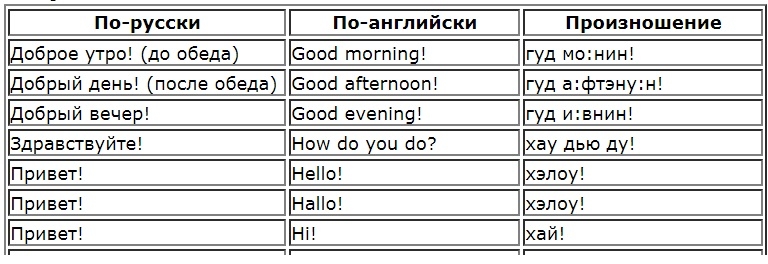
You can start a conversation not with standard phrases, but using "emotional" vocabulary.

It will not be superfluous to ask his interlocutor about how he is doing. This phrase does not have to be a separate part of the dialogue, it can follow the following after the word “Hello” (Hello!).
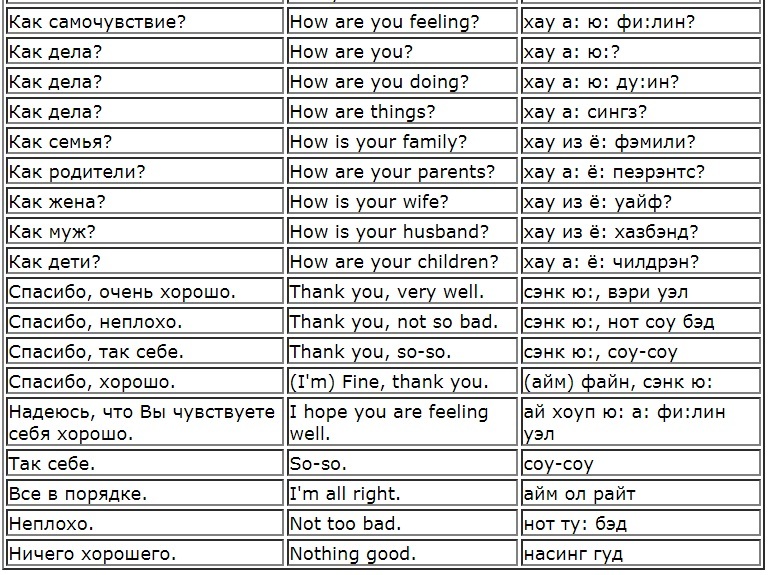
Important: to hear the clear and correct pronunciation of the words and phrases of this vocabulary from the native speaker, try to listen audio files with a record vote.
Exercises in English for children on the topic "Greeting, acquaintance"
It is not enough just to offer the child a new vocabulary for study, a good teacher will surely consolidate it with the help of exercises and colloquial speech. Try to perform a number of exercises with your child, do not be shy emotionally pronounce all phrases of greeting or dating, after all, in many ways, not only memorization depends on this, but also the correct pronunciation.
Exercises:
- Task number 1:It can be written or oral. All that is required is to insert the necessary thematic word or the phrase so that a full dialogue turns out to the missed places. Then the dialogue must be played.
- Task number 2:Here, the child should correctly “react” to any English replica with the necessary thematic word or phrase.
- Task number 3:A simple task that is performed orally. Here you only need to translate the phrase into English (or recall some of its equivalent).



Dialogue in English for children on the topic "Greeting, acquaintance" with translation
Dialog - One of the most popular and effective forms of work in English lessons. It is good for literally dipping the student into foreign vocabulary, forcing to find the necessary phrases, train memory and leave any situation.
The dialogue is much more effective than a monologue (speech from one face), because here vocabulary is closely it is associated with the emotional state of a person and his interest in the interlocutor. Dialogues should be played by simulating the situation or place (for example, a store or school), since this technique forces the child to work on associations, which means that knowledge settles deeper in memory.
Dialogs:
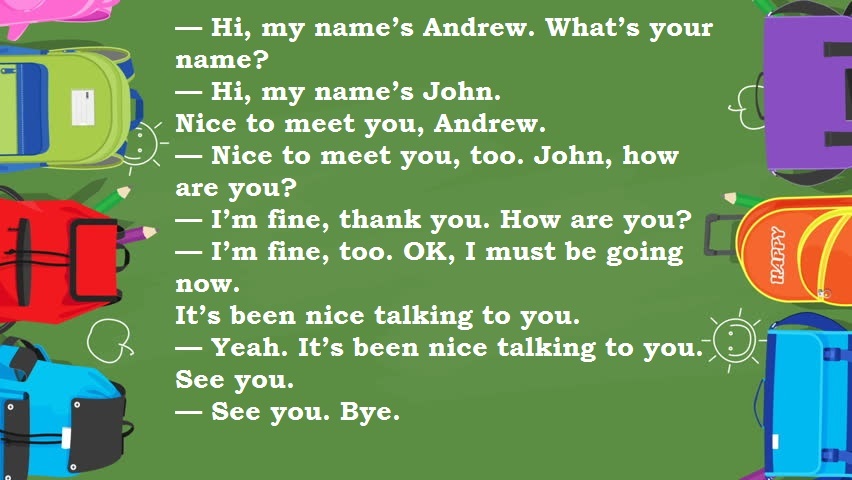
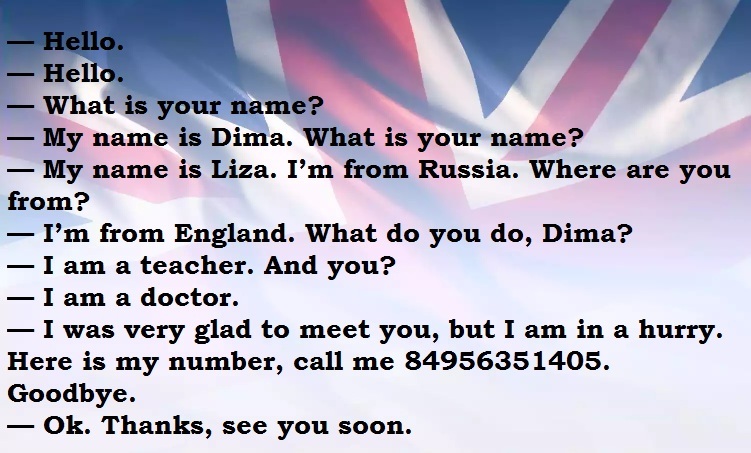
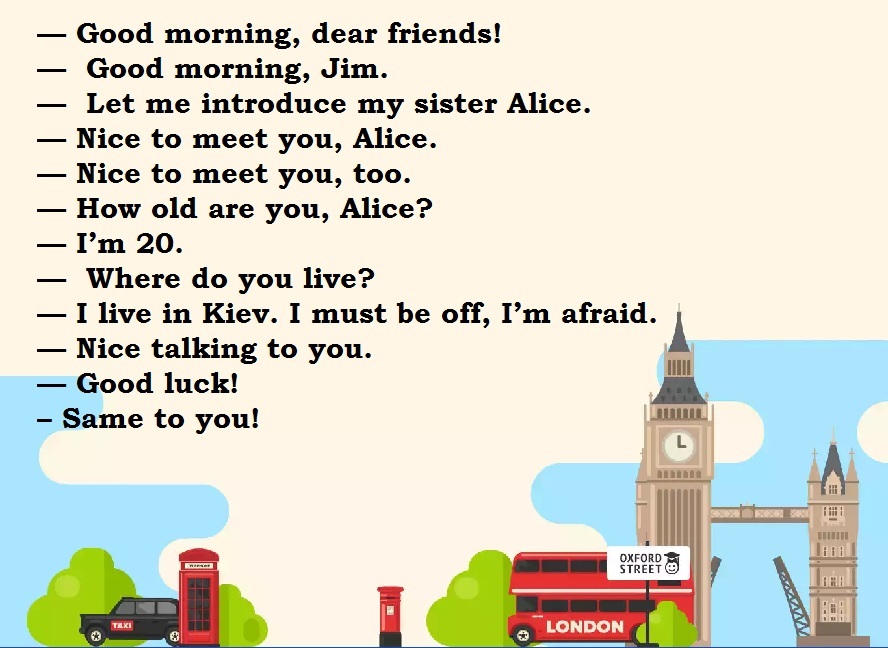
Translation:
Dialogue No. 1:
- Hello! My name is to the eede (Andrey). What is your name?
- Hello! My name is John. Glad to meet you, Andrew!
- I am also glad to meet you! How are you?
- I'm good! Thanks for asking! And how are you?
- I `m alright too! Sorry, but I need to run! It was nice to talk to you!
- I was also pleased to talk to you. Bye!
- Bye! See you!
Dialogue No. 2:
- Hello!
- Hello!
- What is your name?
- My name is Dima, what is your name?
- I'm calling me Lisa from Russia, and where are you from?
- I'm from England, what are you doing?
- I'm a teacher who are you?
- And I'm a doctor. Sorry, I'm in a hurry now, but here you have my phone number. Call me! Bye!
- OK see you later!
Dialogue No. 3:
- Good morning dear friends!
- Good morning, Jim!
- Let me introduce myself, my name is Alice!
- We are glad to meet you, Alice!
- Oh, I am also very pleased!
- And how old are you, Alice?
- I'm 20.
- And where do you live?
- I live in Kyiv. Sorry, I have to go now.
- It was nice to talk to you!
- Good luck!
- Mutually!

Phrases in English for children on the topic "Greeting, acquaintance" with transcription and translation
Transcription and translation will help your child (or a beginner in studying English) not only well remember the vocabulary, but also pronounce it correctly with intonation and stresses. Use the proposed list of phrases and train their pronunciation, focusing on transcription, Russian pronunciation and, of course, translation.


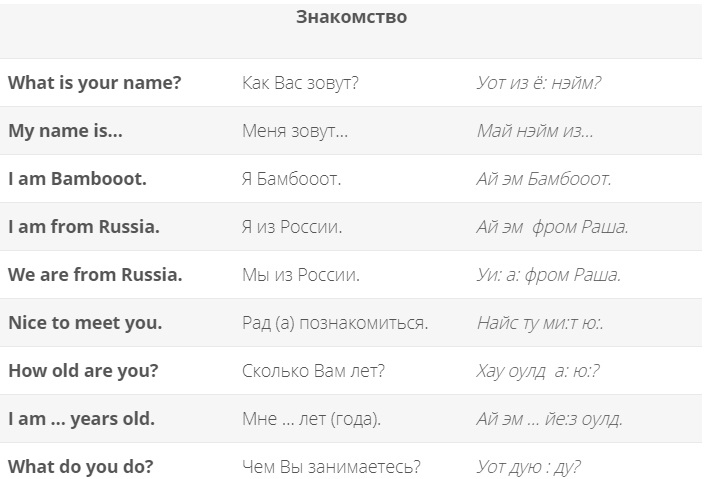

Songs for children in English on the topic "Greeting, acquaintance" with translation
Songs will help your child easily and interestingly learn the language. Dancing and performing movements, words and vocabulary will be remembered very quickly and “tight”. It is recommended to start a lesson from songs and use them as a warm -up.
Songs:

Video: "The Greetings Song"
Cards in English on the topic "Greeting, acquaintance" with translation
Cards - a type of visualization that helps a lot in learning the language. The cards can be large (which can be hung on the board) or small (to complete individual and group tasks).




Games in English on the topic "Greeting, acquaintance"
Most of all, children love to play, surprisingly, the game is one of the most effective forms of teaching a child to English. Games using thematic vocabulary help the child:
- Recall previously studied words
- Actively use English vocabular in speech
- To ask questions
- Anwser the questions
- Practice speech and pronunciation
- Interested in English lessons
What can you play:


Tasks in English on the topic "Greeting, acquaintance"
Each lesson must include written work, so invite the student to perform one or two exercises. It is good if you prepare and print tasks in advance (this will save your time to explain and allow the child to quickly understand the essence of the tasks).
For example:
- Task number 1:You need to combine the English phrase and its exact translation with one line (they are mixed in the task).
- Task number 2:You see a dialogue in front of you, you need to fill it out where there are not enough words.


Riddles, songs in cartoons in English on the topic "Greeting, acquaintance" with translation
In English lessons, multimedia additions (video, cartoons or songs) should be used. This is a funny way to diversify the lesson and attract the attention of the child, because all children love cartoons.
Pay attention to such video files:
- Cartoons-song "How are you?"
- Super Song "Hello"
- Hello from Kids
- Cartoon-diaagun on the topic "Greeting"
- How to introduce yourself? (cartoon)
Tips for independent study of the topic in English "Greeting, acquaintance"
Tips:
- So that the lesson is interesting to the child, try actively use the vocabulary that he remembered earlier And do not introduce complex new words.
- Stage as many dialogs as possible, after all, practicing, the child will be able to better remember phrases.
- Make dialogs for realistic,for example, play a meeting of old friends or acquaintance at school.
- Saturate the lesson in visualitiesaudio and multimedia files.
- Try to arrange a dialogue with a native speaker -it can be a real conversation with a foreigner, or his imitation. You can also stage the census in social networks or with the help of mail.








I found a cool greeting for myself
thanks
Cool